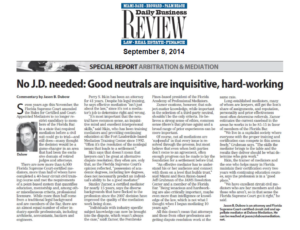A New Year of Resolve: Saying Goodbye to LAST-YEAR’S Litigation and Hello to THIS-YEAR’S Agreed Settlement
By Stanley Zamor
“It’s 20XX. Time to let LAST-YEAR go! You decide. It is time to accept and expect THIS-YEAR to be the year of RESOLVE!” During the various mediations I facilitated in 20XX, a common theme I heard by participants to explain their discourse, was that 20XX was a year of build-up, peculiarity and conflicts that seemed to spiral out of control; so the parties (and their attorneys) were ready to settle. Although parties, and their counsel, self-described the dispute(s) as being “simple”, as the mediation process progressed, simple issues revealed themselves more intractable. As a professional neutral I am not surprised by parties being unrealistic about the simplicity of their issues (and their resolve). Managing expectation is not a problem, and it is what a trained professional neutral is trained to do.
So, how do mediation participants leave the past and the old year behind (analogous to litigation); and move forward like a New Year’s Eve countdown, eager to see the ball drop in Times Square, and at the stroke of midnight, be ready to usher in a new year, a new resolve, an agreed settlement? The anticipation and expectations of a new year bring new hopes, new dreams, and the achievement of new goals. But timing is the key; and unless participants are ready to reach a resolution, they will not settle. To gauge unsure participants and their preparedness to settle, after their 2013 cynical statements, I offered for consideration, “…Preparing a mediation settlement agreement is like preparing for a new year, with New Year’s resolutions. You craft your goals, and how you want your present and future to be; while litigation focuses on the past year that is now gone. Litigation forces you to relive regrets, wrongs, missed opportunities and hurts. Although litigation is your right, and allows you to receive a decision, others ultimately assign a value to your position, with which you may not agree. Your hurt feelings and intangible concerns are rarely addressed in litigation; and the ‘I SHOULDAS, I WOULDAS, I COULDAS…But I DIDN’T…’ do not get expressed. However, during a mediation session, there is usually an opportunity to address such concerns and that is when it becomes easier to start fresh, new, and agree to resolve the matter through an agreed settlement…”
After further dialogue and self-assessments, most of the participants saw the value of reaching a settlement agreement that day and were ready to resolve the matter. I was told that after the mediation session, the settlement agreement created gave them the ability to move forward, onward and upward. Holding on to the past through litigation felt like dwelling on the “yesterday”, it held them back; and also, living to litigate a case, continued to hurt more than help. While creating and preparing a settlement agreement, helped set clear future goals, let them be heard and more importantly, allowed for forgiveness and the acceptance of an, “I’m sorry…”. HAPPY NEW YEAR!
(updated, 2018)



